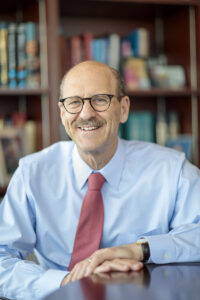The 2025 Dean’s Scholars Cycle will open on August 15, 2024
Please return here for details then!

The Dean’s Scholars program supports outstanding MD-only individuals committed to a career as a physician-scientist. This program alleviates the scholar’s financial stress and provides them with mentorship, institutional support, and the protected time necessary to generate data and publications. At the end of the support period Scholars will be competitive for NIH K08 and related awards and be on the path to a successful career.
Applicants are evaluated based on their evidence of commitment to research, the quality of their research proposal, the strength of their mentorship team and training environment, and the impact that support from the Dean’s Scholars program would have on their career.
Financial support
Selected Dean’s Scholars will receive support for up to two years, including $50,000 per year towards their salary, in addition to annual travel to a basic research conference and to the meeting of the American Society for Clinical Investigation, which showcases physician-scientist research.
The Scholars program will also provide up to $50,000 per year in educational loan repayment for those who are ineligible for the NIH loan repayment program because of citizenship requirements or research in an area not covered by the NIH LRP. For more information including complete eligibility guidelines for loan repayment, see here.
While Dean’s Scholars may not have an NIH K award or equivalent at the time of application, they will remain eligible to apply for K awards during the support period.
Departmental commitment
Departments must agree to provide at least $50,000 per year in matching support towards a selected Dean’s Scholar’s salary. If it is not possible to put these matching funds towards the Scholar’s salary, the department may contribute the matching funds towards the Scholar’s research. In addition to salary support, departments must provide their Scholar with a faculty appointment and ensure at least 75% protected time for research for non-surgical specialties. For applicants in surgical or other procedural specialties, the proposed amount of protected research time may follow NIH K08 guidelines (typically no less than 50%).
Eligibility
The ideal applicant has completed most if not all clinical training, is currently focused on laboratory research, and seeks additional research support and protected time to be competitive for research career development awards, such as a K08, and independent research funding. Washington University School of Medicine has explicitly endorsed efforts to increase the diversity of its ranks, and accordingly, candidates from groups underrepresented in medicine (URiM) and/or the biomedical sciences are especially encouraged to apply.
Applicants must:
- Have an MD or equivalent degree (MD-PhDs or PhDs are not eligible).
- Have completed most if not all clinical training and be focused on laboratory research by the award start date.
- Have at least 75% time (preferably more) devoted to basic science research for non-surgical specialties. Those in procedural specialties may propose a percent research time consistent with NIH guidelines (typically no less than 50%).
- Propose a basic science project. Clinical or epidemiological research is not appropriate for this program. Translational research is acceptable if the work is primarily laboratory-based.
- Be eligible for mentored support, such as NIH K award.
- NOT already have a K award or related mentored or independent grant at the time of application.
- NOT be the PI or co-PI on another significant extramural grant at the time of application.
- NOT already have an independent research program or significant start-up funds.
- If selected for an interview, applicant must be available for a 30-minute interview in the morning on January 30, 2025.
Please contact Jacqui Hawkins (jahawkin@wustl.edu) if you have any questions related to your eligibility.
Mentorship
The Dean’s Scholars program is a mentored research award. Applicants must identify a mentorship committee which is expected to meet at least twice per year during the funding period to follow the Scholar’s progress and provide guidance. The committee should be able to support the Scholar in achieving their stated career goals and should include:
- The primary mentor, in whose lab the scholar will perform the proposed studies.
- A committee chair, with scientific expertise in the Scholar’s field, who is not the Scholar’s primary mentor or from their clinical department/division.
- A representative from the Scholar’s clinical department (or division for large departments such as Medicine), who can provide career guidance specific to their clinical specialty/subspecialty.
- One additional scientific mentor. This person should complement, rather than duplicate, the expertise of other members of the committee.
- A representative from the Division of Physician-Scientists will be assigned to each Scholar and will join the mentorship committee.